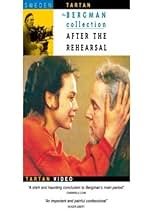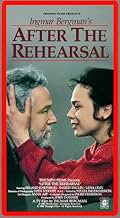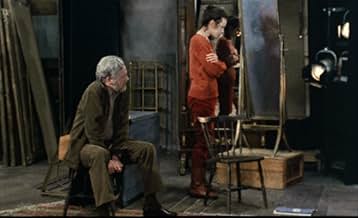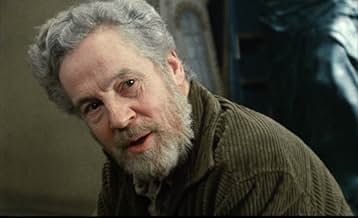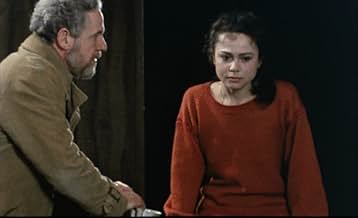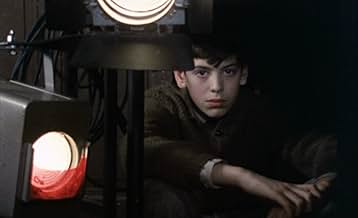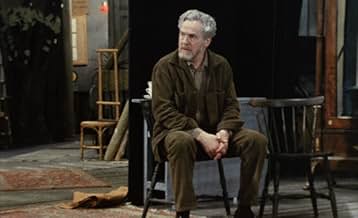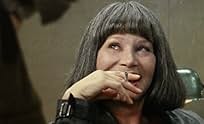CALIFICACIÓN DE IMDb
7.1/10
3.1 k
TU CALIFICACIÓN
Henrik, un director teatral, y Anna, la actriz principal de su última puesta en escena, hablan del pasado familiar y de sus hijos.Henrik, un director teatral, y Anna, la actriz principal de su última puesta en escena, hablan del pasado familiar y de sus hijos.Henrik, un director teatral, y Anna, la actriz principal de su última puesta en escena, hablan del pasado familiar y de sus hijos.
- Dirección
- Guionista
- Elenco
- Premios
- 2 nominaciones en total
- Dirección
- Guionista
- Todo el elenco y el equipo
- Producción, taquilla y más en IMDbPro
Opiniones destacadas
This is only my second Ingmar Bergman viewing, the first being the magnificent "Seventh Seal", which left me with a long lasting impression. Perhaps it is not fair to compare this little ditty to the impressive, thoughtful epic that was the former film, but it was with such unrealistic expectations that I started watching "After the Rehearsal".
Unfortunately, I left the film disappointed and indifferent. The plot revolves around an aging play director's relation to his young lead actress, and concerns itself with acting, the personal relations of people in the profession, parenthood and estrangement. Alas, I'm afraid even my simplistic presentation makes the film sound far more interesting than it really is. In the end, "After the Rehearsal" only amounts to a monotonous (if articulate) study of romantic and interpersonal manipulation. I suppose viewers interested in acting and the theater might find something of interest in this movie, especially concerning the issues of what it means to act and direct, and how it affects persons of the field.
Personally, however, I was not engaged at all to the characters' petty personal issues, nor could I project parallels to issues larger than their own particular microcosm from their mundane -if eloquent- verbal sparring. If the "Sevent Seal"'s characters could be likened to those of Dostoyevsky's literature, "After the Rehearsal"'s protagonists would be more similar to Oscar Wilde's aestheticists and their monologues. Who do you prefer?
Unfortunately, I left the film disappointed and indifferent. The plot revolves around an aging play director's relation to his young lead actress, and concerns itself with acting, the personal relations of people in the profession, parenthood and estrangement. Alas, I'm afraid even my simplistic presentation makes the film sound far more interesting than it really is. In the end, "After the Rehearsal" only amounts to a monotonous (if articulate) study of romantic and interpersonal manipulation. I suppose viewers interested in acting and the theater might find something of interest in this movie, especially concerning the issues of what it means to act and direct, and how it affects persons of the field.
Personally, however, I was not engaged at all to the characters' petty personal issues, nor could I project parallels to issues larger than their own particular microcosm from their mundane -if eloquent- verbal sparring. If the "Sevent Seal"'s characters could be likened to those of Dostoyevsky's literature, "After the Rehearsal"'s protagonists would be more similar to Oscar Wilde's aestheticists and their monologues. Who do you prefer?
Here's a bit of an odd confession. I'm starting to like this Ingmar Bergman guy. Mind you, I've only seen two of his films (the other being Cries and Whispers) but he knows how to make a film, let me tell ya! After the Rehearsal is a great movie that makes you think, while marveling how clever the whole thing is. A theater director (played by Erland Josephson) is putting together a production called "The Dream Play". One of his actresses (Lena Olin) stays behind to talk to him about past experiences, his life and hers, and other existential topics. He does the same. A little while later an older actress comes on the scene, and essentially talks the same talk, only a little older but definitely not wiser. The interesting thing about this is, is that both women don't acknowledge the other.. So what's that about? Was this the same woman, only years later? Did these women exist at all, or are we indeed watching a "dream play" already? So many fascinating theories, I love it when a movie does that to me. The movie somewhat lags during the third act, but let me tell you, Bergman KNOWS how to end movies, like in Cries and Whispers and this one, it leaves some questions unanswered for us to figure out by ourselves, and Bergman seems to rejoice yanking us away from the story to go to the credits, which is great.
I want to see more! I will see more! Yay!
I want to see more! I will see more! Yay!
Fanny and Alexander, to Ingmar Bergman, IS his last released film, written and directed by him. But this film, which was originally meant only for Swedish television, found its way to the USA and abroad, and (excluding Saraband, which was a film that just had to be made by its maker) is a welcome piece of theater, about the theater. After the Rehearsal is a short, but extremely satisfying take on what it means to be a director, and what it means to act, or to just be in the profession of the imitation of life. Bergman gives us only three actors (two kids, who pop up only for a few moments, one of which the child who wonderfully played Alexander in the above title, is one of them), and all that happens is talk, and talk.
To one who may not be familiar well with Bergman, it may not be wise to go immediately to this film. That is, unless one is very much in love with the theater. The filmmaker, who was also a major producer and director of countless theatrical production, is able to suffuse his personal views, good and bad, on the process, or the lack thereof. Interesting too is how his lead male, Henrik (Erland Josephsson, one of Bergman's most recognizable and accessible talents), has a conversation not just with an aspiring actress (Lena Olin), but also his ex-wife (Ingrid Thulin, also one of the magnificent women from Bergman's repertory company), to explore his past and present difficulties.
There is so much that Bergman brings to the table to discuss about the theater in this film, and in such a short running time, that it might be moot to delve very far into his what certain things may or may not 'mean'. Like many of the director's films, it's dramatic structure that tries to get behind the surfaces of what lies in seemingly one or two-sided characters. Henrik, at times, is given voice-over narration where he questions what he's saying, sometimes in anger or despair, to this young actress. Or, when his love (Thulin) is shown to be somewhat compassionate even as she seems a little crazed or, in fact, lonely. As Henrik and his pupil talk (not rehearse, of course) about why they are there, it becomes strikingly existential even when it's not meant to be. Olin is brilliant in the opposing side of Josephsson's often calm but boiling persona, as she tries to figure out what it is this director wants out of her.
When it comes down to it, Bergman is not only asking questions about the theater and the people in it, but also about human nature in its role of the theater. While this could sound like subject matter to scare or (worse) bore away some viewers, if you give the film enough patience for the 72 minutes (that seem to fill each minute with enough substance for an average work twice its length), it serves its purpose well enough to not be disregarded as an important later work in Bergman's career. And, by the way, if you're young (i.e. under 17) and have some reason to want to check this out, don't let the R rating deter you; it's one of the most un-necessarily R-rated films ever (for a brief flash of nudity, which could very well even be given a PG rating). A+
To one who may not be familiar well with Bergman, it may not be wise to go immediately to this film. That is, unless one is very much in love with the theater. The filmmaker, who was also a major producer and director of countless theatrical production, is able to suffuse his personal views, good and bad, on the process, or the lack thereof. Interesting too is how his lead male, Henrik (Erland Josephsson, one of Bergman's most recognizable and accessible talents), has a conversation not just with an aspiring actress (Lena Olin), but also his ex-wife (Ingrid Thulin, also one of the magnificent women from Bergman's repertory company), to explore his past and present difficulties.
There is so much that Bergman brings to the table to discuss about the theater in this film, and in such a short running time, that it might be moot to delve very far into his what certain things may or may not 'mean'. Like many of the director's films, it's dramatic structure that tries to get behind the surfaces of what lies in seemingly one or two-sided characters. Henrik, at times, is given voice-over narration where he questions what he's saying, sometimes in anger or despair, to this young actress. Or, when his love (Thulin) is shown to be somewhat compassionate even as she seems a little crazed or, in fact, lonely. As Henrik and his pupil talk (not rehearse, of course) about why they are there, it becomes strikingly existential even when it's not meant to be. Olin is brilliant in the opposing side of Josephsson's often calm but boiling persona, as she tries to figure out what it is this director wants out of her.
When it comes down to it, Bergman is not only asking questions about the theater and the people in it, but also about human nature in its role of the theater. While this could sound like subject matter to scare or (worse) bore away some viewers, if you give the film enough patience for the 72 minutes (that seem to fill each minute with enough substance for an average work twice its length), it serves its purpose well enough to not be disregarded as an important later work in Bergman's career. And, by the way, if you're young (i.e. under 17) and have some reason to want to check this out, don't let the R rating deter you; it's one of the most un-necessarily R-rated films ever (for a brief flash of nudity, which could very well even be given a PG rating). A+
I may be biased though as I love and admire Ingmar Bergman. After The Rehearsal mayn't be among Bergman's very finest films, but it does deserve to be much more regarded as just a minor work. It could have done with being longer perhaps but all the things that make a Bergman film work are here. The cinematography from none other than Sven Nykvist is tight and helps to intensify After the Rehearsal's intriguing drama, while the setting looks beautiful yet realistic. Bergman as he always did directs with discipline, never once is there a sense that his heart was not in it. The scripting is intelligent and provokes a lot of thought, likewise the story is insightful in regard to art and emotion- I always admired how ambitious the themes in his films were- and almost autobiographical in structure. I have seen and heard people remark that they were indifferent to the characters, now the characters in Bergman's films are not always that likable but considering how realistically compelling they are(especially the women) you do get the sense that they weren't meant to be. Adding to this is how superbly acted After the Rehearsal is, you get that expectation seeing as we are talking about some of Sweden's finest ever actors and never here are you disappointed. All three leads, very hard to single out a standout, are really captivating and immerse themselves totally into the characters. All in all, very, very good. 9/10 Bethany Cox
This is a brilliant work of art - it manages to be both an outstanding piece of theatre captured on film and an equally engaging film about theatre. There is no plot in a conventional sense, and absolutely no action. Instead, Erland Josephson, utterly convincing in his role as an aging theatre director, quietly and with ruthless honesty interacts with both his current new star and an actress from his personal and professional past. During this interplay, the director on the screen (speaking for the director behind the camera?) explains his love for actors and the theatre, while simultaneously modeling and undermining the sense of alienation that he feels he needs to have in order to get his job done in this world that he loves. At the same time, his young star examines her reasons for acting, and the woman from his past presents yet another take on the function of theatricality.
The dialogue is, as always with Bergman, perfect; the film is saturated with ideas; and the simple stage where every moment of the film takes place works in two directions at once, reminding us that we are watching a performance even while it insists we are also seeing "real" people at work.
Bergman is always amazing in his ability to express, in films that are set in singular specific locations, deep emotions and concepts that are nonetheless universal - in this film he gives us a little bonus, an insight into the motives behind manufacture of representation itself.
The dialogue is, as always with Bergman, perfect; the film is saturated with ideas; and the simple stage where every moment of the film takes place works in two directions at once, reminding us that we are watching a performance even while it insists we are also seeing "real" people at work.
Bergman is always amazing in his ability to express, in films that are set in singular specific locations, deep emotions and concepts that are nonetheless universal - in this film he gives us a little bonus, an insight into the motives behind manufacture of representation itself.
¿Sabías que…?
- TriviaIngmar Bergman was so impressed when he met Lena Olin for the first time that he wrote the part of Anna especially for her.
Selecciones populares
Inicia sesión para calificar y agrega a la lista de videos para obtener recomendaciones personalizadas
Detalles
Taquilla
- Total a nivel mundial
- USD 942
Contribuir a esta página
Sugiere una edición o agrega el contenido que falta

Principales brechas de datos
By what name was Después del ensayo (1984) officially released in India in English?
Responda
